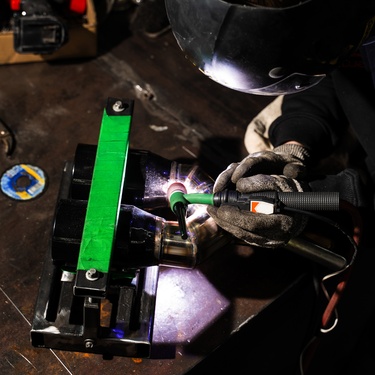
Are you moving out and need to learn how to prepare meals for yourself? Or are your current cooking skills lacking despite years of practice? You might be feeling overwhelmed if all you seem to be able to produce are burnt, bland, or poorly cooked meals. Fortunately, though cooking may be harder than it looks, it’s a perfectly achievable life skill if you invest enough time and practice.
Below, we check out nine newbie cooking mistakes and how to avoid them so you can start improving your chef game today.
1. Not Reading the Recipe All the Way Through
Imagine this: You start cooking, everything seems fine, then suddenly the recipe calls for an ingredient you don’t have or a technique you’ve never heard of. When this happens, it can throw the whole recipe off the rails.
The Fix
Always read the entire recipe before you start cooking, making sure you actually understand the words on the page. Check that you have all the ingredients, understand the cooking methods, and note how long each step takes.
2. Skipping the Prep Work
Chopping vegetables while your onions burn in the pan is a classic mistake, and it’s easy to avoid. Professional chefs have a term for this: “mise en place,” which means “everything in its place.”
The Fix
Do all your prep work before you turn on the stove. Wash, chop, and measure everything. Set out your tools. Use small bowls to organize your prepped ingredients. You’ll thank yourself later!
3. Using the Wrong Pan Size
That recipe calling for a 12–inch skillet is more than just a suggestion. Though you can fudge with the size a little bit, don’t stray too far from the recommendation. If your pan is too small, your food will overcrowd, which does two things: It prevents heat from evenly reaching all the pan’s contents, and it traps moisture that results in sogginess. Likewise, if your pan is too big, the gaps between the food could allow too much moisture to escape, leading to a dry meal. It’s also much easier to burn food in a too-large pan.
The Fix
Have a few basic pan sizes on hand: an 8-inch skillet for small portions, a 12-inch for larger meals, and a large, heavy-bottomed pot for soups and stews. When in doubt, go bigger rather than smaller. Overcrowding is usually worse than having extra space.
4. Not Preheating Properly
Throwing food into a cold pan or oven leads to uneven cooking and disappointing results. Oftentimes, your food needs that initial blast of heat to cook properly.
The Fix
When the recipe tells you to preheat your oven, do it! For stovetop cooking, heat your pan for 2–3 minutes before adding oil, then let the oil heat for another 30 seconds before adding food. However, those are very general guidelines. The time depends on the pan’s material (cast iron pans take the longest to heat up) and the oil (ones with a high smoking point are best because they won’t destabilize on a preheated pan).
5. Moving Food Around Too Much
New cooks often poke, prod, flip, and stir constantly. Unfortunately, this prevents some foods from developing that beautiful golden crust that adds so much flavor.
The Fix
Unless the recipe tells you to stir constantly, let your food cook undisturbed. When searing meat, resist the urge to move it for the first few minutes. When roasting vegetables, let them sit long enough to caramelize.
If you’re unsure when to flip, look for visual cues. Meat will release easily from the pan when it’s ready to flip. Vegetables will have golden edges.
6. Not Seasoning Properly
Under- and unseasoned food is bland and disappointing. Moreover, seasoning isn’t just about adding salt and other spices at the end—it’s about building flavor throughout the cooking process.
The Fix
Season your food at every stage. You can marinate your protein before it even hits the pan, introduce spices to your aromatics (e.g., onions and garlic) as they cook, and layer other seasonings throughout cooking. Do make sure that you introduce most of the flavor at the beginning of the process, as that’s when your food is most able to absorb and meld with it.
7. Over- and Undercooking Food
One of the easiest ways to ruin a meal is by not paying attention to cooking times. Overcooked food is dry, tough, and flavorless, and undercooked food may be unsafe to eat or lack the proper texture. For example, you shouldn’t cook steak well done if you want to preserve its juiciness and natural flavor.
The Fix
Know how long your specific food takes to cook, then use a timer and check for doneness regularly with a thermometer or small taste tests for things like pasta. Moreover, remember that residual heat continues to cook food even after you take it off the heat source. Resting your meals, especially meats, will allow for carryover cooking and optimal results.
8. Using Dull Knives
A dull knife is dangerous and inefficient. When you apply more pressure to the blade to make it cut, it is more likely to slip and harm you. Plus, dull blades tend to crush food instead of cutting cleanly.
The Fix
You can use a knife sharpener, sharpening steel, or a professional service to keep your knives sharp. Test your knife’s sharpness by cutting a piece of paper; it should slice through cleanly without tearing.
9. Not Tasting as You Go
Cooking without tasting is like driving with your eyes closed. You won’t know if your food needs more salt, acid, or spice until it’s too late.
The Fix
Start with less seasoning than you think you need, then build up, tasting as you go. Keep a stack of clean spoons nearby for tasting, and never put a used spoon back into the food—unless it’s just for yourself, of course!
These newbie cooking mistakes are part of every home chef’s learning journey. Now that you know how to avoid them, you can make better meals for yourself and your loved ones. And remember that cooking is a skill that improves with practice. Each time you cook, you’re building your intuition and understanding of how ingredients behave under heat. It’s okay to make mistakes, as you’ll learn from each one. Soon, you’ll be cooking intuitively, adjusting flavors on the fly, and creating delicious meals that you can be proud of.
Bio: Casey is a passionate copyeditor highly motivated to provide compelling SEO content in the digital marketing space. Her expertise includes a vast range of industries from highly technical, consumer, and lifestyle-based, with an emphasis on attention to detail and readability.






















